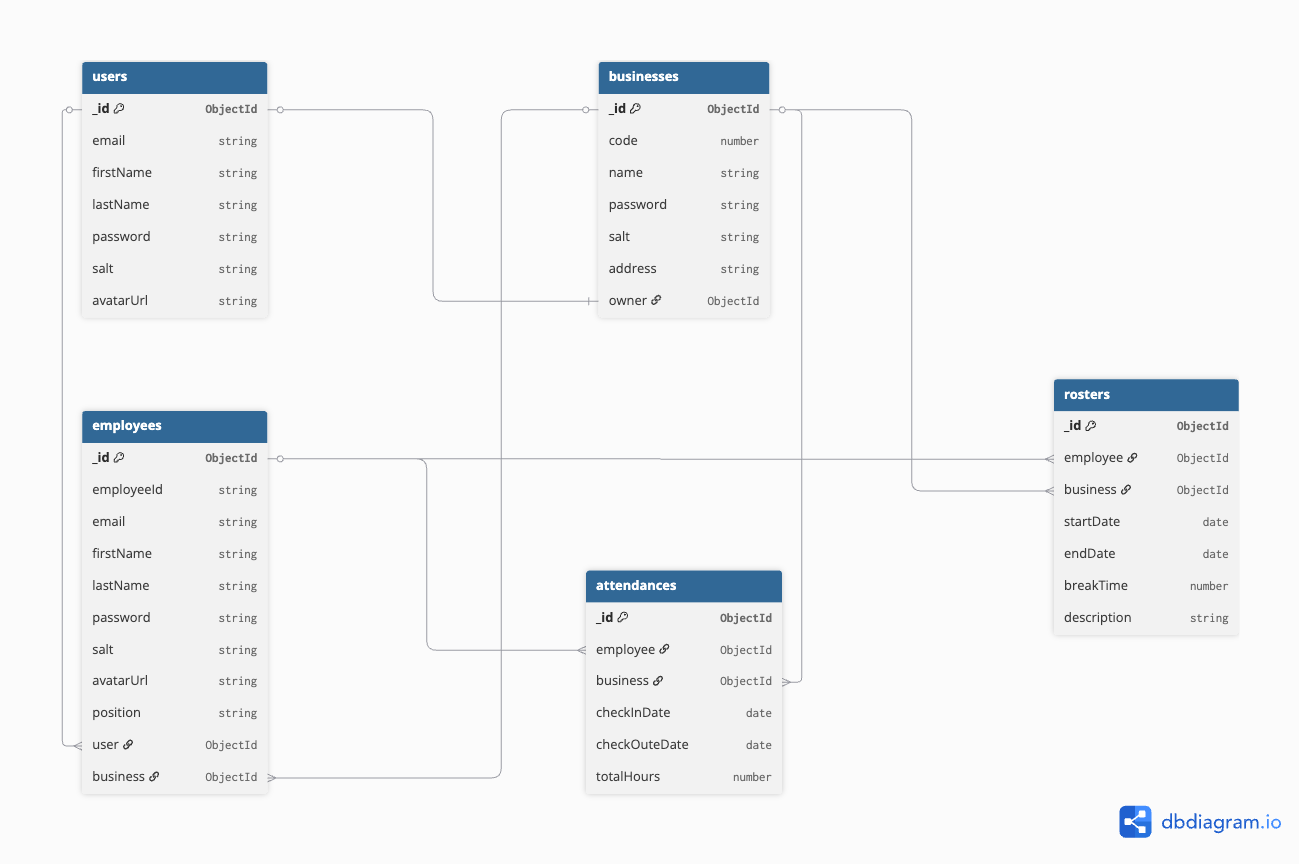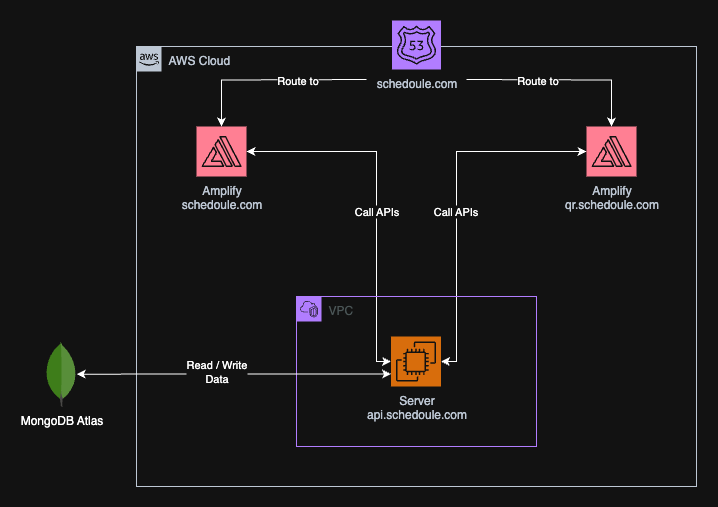Schedoule
👀 Overview
Schedoule is a prototype of a roster management application with the core functions are roster assignment on an interactive calendar and QR code scanning for employees to clock in and clock out.
🔗 Links
Github: click here
Demonstration video: click here
🔥 The tech stack
- Front-end: NextJS, ReactJS, Zustand
- Back-end: NodeJS, Express
- Database: Mongo, Redis
💻 Application structure
- schedoule.com: Main site for both employee and business owner.
- qr.schedoule.com: This site is the QR code generator and is open at business workplace for employees to scan the QR code.
💾 Database structure

💡 QR Code implementation
Step 1: Hashing the QR code content
Generate a random string as a salt for hashing
function generateSalt() {
return crypto.randomBytes(16).toString("hex").normalize();
}- Generate QR code using qrcode library
function generateQRCode(businessId: string, salt: string) {
// Using crypto to generate QR code token with the salt
const token = crypto
.createHmac("sha256", salt)
.update(businessId)
.digest("hex")
.slice(0, 10); // Shorten for simplicity
// Concatenate a string to an API endpoint with the QR Code token as a param
const qrURL = `${process.env.CLIENT_URL}/attendance?token=${token}`;
// Return the QR with a format data:image/png;base64,...
return await QRCode.toDataURL(qrURL, {
errorCorrectionLevel: "L",
type: "image/png",
scale: 10,
});
}
Step 2: Create an API endpoint to get the QR code
const getQRCode = async (req: Request, res: Response) => {
try {
const businessId = req.userId;
// Try to get QR code data from Redis by the Business ID
const value = await redisGet(`qr-code:${businessId}`);
// Set a new value to Redis if there is no existing QR Code
if (!value) {
const salt = generateSalt();
const qrCode = await generateQRCode(businessId, salt);
await redisSet(
`qr-code:${businessId}`,
JSON.stringify({ salt, qrCode }), // Set both salt and qrCode
30 // Valid for 30 seconds
);
res.status(200).json({
new: true,
qrCode: qrCode,
});
return;
}
// Otherwise return the existing QR code
const { qrCode } = JSON.parse(value);
res.status(200).json({
new: false,
qrCode: qrCode,
ttl: await redisTTL(`qr-code:${businessId}`), // Return the remaining time
});
} catch (error: any) {
console.log(error);
res.status(500).json({ error: error.message });
}
};
Step 3: Display the QR code using <img /> tag
<img src={qrCode} alt="QRCode" />
Step 4: Employee check in API endpoint
export const checkIn = async (req: Request, res: Response) => {
try {
// Get QR code token sent from the client
const {token} = req.body;
const businessId = req.userId;
// Get salt from Redis to compare
const tokenToCompare = await redisGet(`qr-code:${employee.business}`);
const { salt } = JSON.parse(value);
// Regenerate the token using the same salt to compare
const validToken = crypto
.createHmac("sha256", salt)
.update(employee.business.toString())
.digest("hex")
.slice(0, 10);
// Compare the tokens then return if they are not the same
if (data.token !== validToken) {
res.status(400).json({
error: {
type: "system",
message: "This QR code is invalid!",
},
});
return;
}
// Insert the record to the database if tokens are valid
} catch (error: any) {
console.log(error);
res.status(500).json({ error: error.message });
}
}
🚀 Simple AWS Deployment

- Route 53: Manages all essential DNS settings.
- Amplify: Hosts and manages both client sites, with generated SSL certificates managed by Amplify.
- EC2: For hosting the main server, configured with Nginx as a reverse proxy to the main server Docker container.
- MongoDB Atlas: A simple database hosting solution.
Thank you for reading!